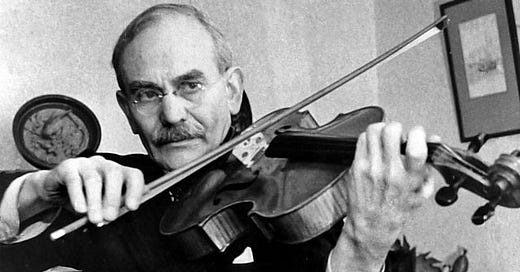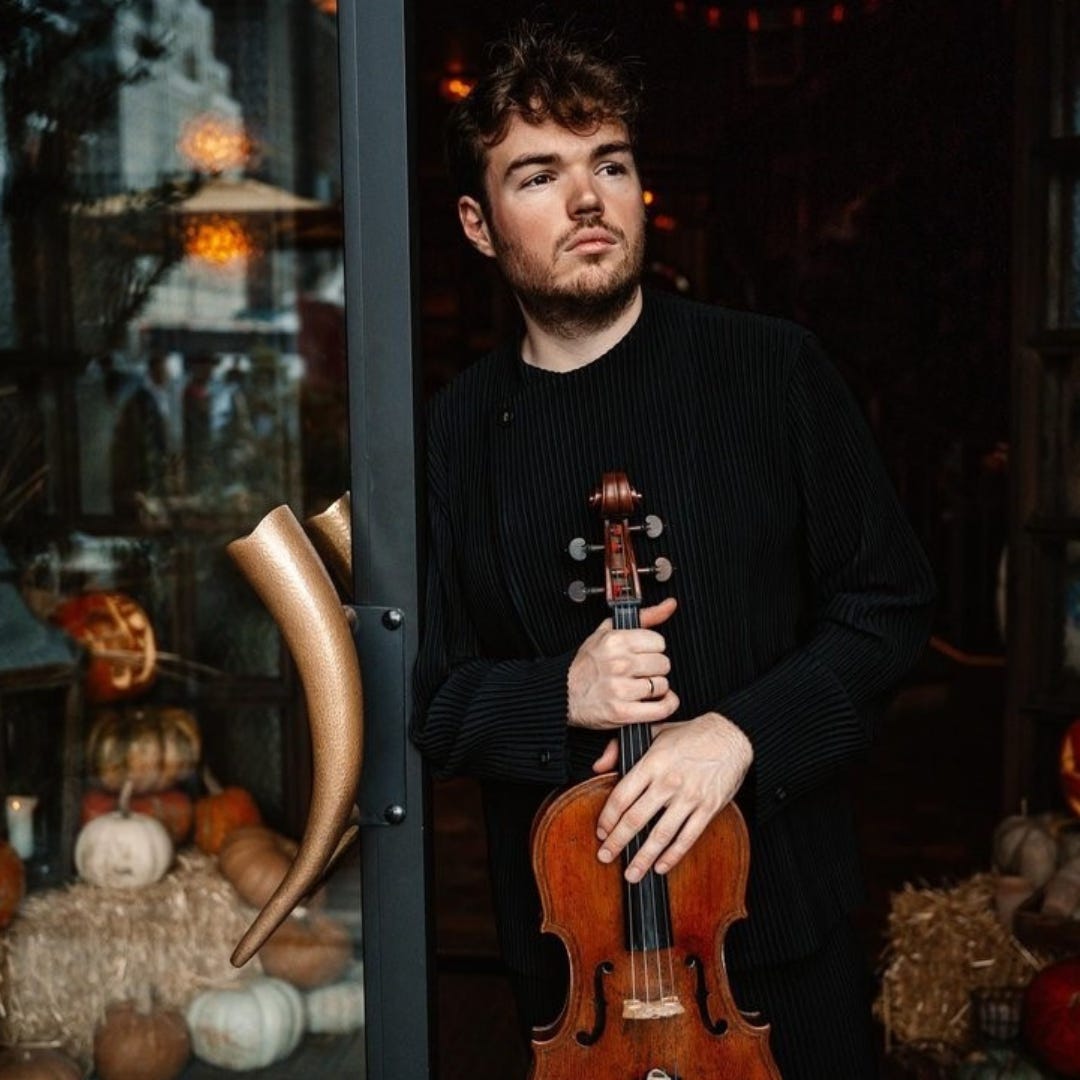Lionel Tertis and the Hartlepool connection
Major international festival celebrates classical musician from Teesside
One of Hartlepool’s lesser-known claims to fame is hitting the spotlight next week when a major classical music festival comes to the town.
Lionel Tertis is world renowned in musical circles for his pioneering work in establishing the viola as a solo instrument. In Sep. 2024, the BBC Music Magazine named him among the 14 greatest viola players of all time, placing him alongside, among others, Mozart. In the early years of the 20th century, Tertis worked tirelessly with the leading composers of the time – including Holst, Vaughan Williams and Walton – to expand the viola repertoire. What is less well known is that he was born in West Hartlepool in 1876.
‘An opportunity not to be missed’
Like many good stories, it started in a pub. Specifically, The Corner Flag in Hartlepool, where the town’s male voice choir meets. A conversation between local historian Eric Wilson and local councillor Philip Holbrook became a call to action.
“When I heard about the history of this guy, and the fact that he was from Hartlepool, I just thought ‘we need to do something with this’,” Cllr Holbrook said.
It wasn’t long before Hartlepool’s cultural services team got in touch with Dr Louise Lansdown, who was working to bring the 2025 Lionel Tertis International Viola Competition to The Glasshouse in nearby Gateshead.
“At first, we were just thinking about how we could celebrate the fact that Tertis was a Hartlepool man. But when we knew about the competition, it was an opportunity not to be missed,” Cllr Holbrook added.
“We jumped on it and looked at doing more than a few workshops. The people organising the competition were keen to send some people down to Hartlepool and we’ve arranged an afternoon concert featuring Timothy Ridout, one of the best young viola players in the world.”
Ridout, winner of the 2016 Tertis competition, is also on that BBC Music list – “absolutely top-notch,” in Cllr Holbrook’s words.
‘Hartlepool has a cultural identity. The main thing is how we progress it.’
That lunchtime recital, on Jan. 21, sees Ridout performing with pianist James Baillieu. The programme includes work by Bach and Brahms, as well as one of Tertis’s own compositions and a sonata that Arthur Bliss wrote for Tertis in 1933. The Town Hall Theatre will also host a display telling the Tertis story. And it could be the start of much more.
The house where Tertis was born, in Regent’s Place, is long gone. A dual carriageway snakes past the site of the old residential streets, close to the fire station and the FE College.
But that isn’t stopping Hartlepool from looking to build on this legacy. Part of the prize for the competition winners is a paid recital in the Town Hall Theatre, and there is talk of working together to support young musicians from the borough as they look to develop their careers. Cllr Holbrook is keen to bring another Tertis-related event to the town next year to mark the 150th anniversary of the musician’s birth.
“It’s all about expanding the cultural offer here in Hartlepool,” he said. “Hartlepool is like everywhere else. It needs its cultural identity, and it has a cultural identity. The main thing is what we do with that and how we progress it.”
‘It’s a kind of rebirth’
The Hartlepool connection was one of the reasons why the Lionel Tertis International Viola Competition – a headline event in the classical music world since 1980 – is moving to the northeast of England this year. The 2025 edition coincides with the 50th anniversary of Tertis’s death in 1975 and – for the first time – will feature a performance in Tertis’s hometown alongside the core programme at the Glasshouse in nearby Gateshead.
Previous editions of the competition were held on the Isle of Man but circumstances meant that era was coming to an end. For Dr Lansdown, one of the festival organisers, the northeast of England was a natural new home.
“I sort of gravitated to where Tertis was from because he really is the lynchpin in terms of the viola,” she said. “We would have been delighted to do the whole thing in Hartlepool, but working with the Glasshouse offers us so much.
“In its 40-year history, the Tertis competition has never been live-streamed and the first send second rounds have never been open to the public to listen. This will be the first time people can hear it without travelling to the Isle of Man. It’s a kind of rebirth.”
The week-long event coincides with the fourth edition of the Cecil Aronowitz International Viola Competition (18 years and under), creating a huge festival of music-making in the Northeast.
‘We’re trying to show these are not barriers anymore’
The move to the northeast also brings new opportunities for the Tertis and Aronowitz competitions. For the first time, the performances will be live-streamed, opening the event to a bigger audience.
Then, as well as the Hartlepool concert, there’s a huge programme around the competitions and great opportunities for musicians in the region to get involved – as well as continuing Tertis’s work transforming the role and trajectory of the viola.
“At the heart of this we have education and developing the future,” said Dr Lansdown. “Typically, it’s been difficult to get young people playing the viola from age five or six. It just isn’t offered as readily as a violin or cello might be. Hubs tended to buy small violins, and changing to the viola would typically happen much later in your musical journey.
“We are shining a light on the viola and hope that still the legacy of Tertis and Aronowitz will bring young people as little as four upwards (you can get wonderful little violas now!) to this beautiful instrument. It’s the closest instrument to the human voice and with the sound of its sonorous C-string the viola is velvety, doleful, tender and majestic.
“For a long time, you couldn’t even get child-sized violas and that’s a massive barrier to people taking it up naturally. We also found people didn’t really want to teach the viola because it uses a different clef.
“One thing we’re trying to show is that these are not barriers anymore. There are child-sized violas available now, reading the clef is quite easy.”
Part of this outreach involves workshops for music teachers, and there are also link-ups with music education programmes from across the North of England. The Glasshouse’s own Centre of Advanced Training is involved, along with In Harmony Gateshead. Youngsters from music hubs and services across the region can access free tickets, and students from Trafford music service near Manchester are also coming.
Music departments at local universities are also involved, with Durham, Newcastle and Northumbria students joining a composition workshop and creating new music for the viola alongside Garth Knox and students from the Royal Northern College of Music.
Instrument makers are also represented, with up to 15 student luthiers from around the world exhibiting their instruments and bows. There are representatives from Spain, Germany and the Newark School of violin and viola making, few of whom will have had an opportunity to exhibit at comparable events in the past. All the instruments on display will be put through their paces in nine public performances as well – a fantastic showcase for the craftsmen.
For full details of the festival programme, and to book tickets for events in Gateshead and Hartlepool, click here.






